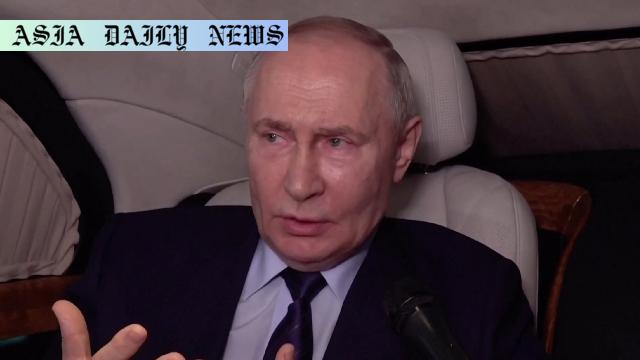Ceasefire: Putin hints at negotiators while pointing out Ukraine’s dependency on Western aid and questioning Zelenskyy’s authority.
- Putin dismisses Zelenskyy’s authority to participate in peace talks due to his expired term.
- Putin suggests appointed negotiators if Ukraine demonstrates willingness to negotiate.
- He emphasizes the need for a long-term ceasefire plan ensuring mutual security.
- Putin believes Ukraine cannot sustain war without Western financial and ammunition support.
- Zelenskyy accuses Putin of stalling and prolonging the war out of fear of decisive leadership.

Putin’s Perspective on Peace Negotiations
Russian President Vladimir Putin recently expressed conditional willingness to facilitate peace discussions with Ukraine, shaking up the ongoing geopolitical tensions. Speaking in Samara to Russian state media, Putin pointed fingers at Ukrainian President Volodymyr Zelenskyy, claiming that his authority to engage in negotiations expired in May of the previous year. Yet, to ensure diplomatic channels remain open, Putin stated that appointed negotiators could step in if Ukraine showcases interest in dialogue.
The Call for Comprehensive Security Guarantees
Putin stressed that any eventual framework or document outlining a ceasefire must extend beyond superficial terms. It must comprehensively address the security concerns of both Ukraine and Russia, solidifying their stability from a historical and long-term perspective. Such a demand underscores the Kremlin’s insistence on strategic dominance.
Ukraine’s Predicament without Western Aid
A pointed critique from Putin highlighted Ukraine’s heavy reliance on continuous Western military and financial support. In his estimation, the absence of these lifelines would render Ukraine incapable of retaliating effectively, ultimately collapsing its resistance efforts within mere weeks. The comment serves as a dual narrative—both a critique of Ukraine’s dependency and indirect commentary on the power dynamics between the East and the West.
Zelenskyy’s Counterarguments
Ukrainian President Volodymyr Zelenskyy responded sharply to Putin’s statements. Using social media as his platform, Zelenskyy accused the Russian leader of deliberately prolonging the war. He referred to Putin as a leader fearful of dynamic negotiations and dependent on what he describes as ‘cynical tricks’ to perpetuate conflict. Zelenskyy also called for international unity and decisive action, emphasizing that coordinated efforts against Russia are essential to resist its aggression.
The Global Implications of the Russia-Ukraine Standoff
This exchange between the two leaders signifies a broader struggle, one not merely confined to their respective nations. Russia’s insistence on specific security measures counteracts NATO’s goals in Eastern Europe, while Ukraine represents a symbolic front-line of Western resilience. While talks of negotiations emerge, the undertones of mutual distrust and strategic posturing reveal how far both sides are from tangible peace agreements.
Analyzing Putin’s Strategy
Putin’s remarks fit into a larger narrative where he leverages global opinion and Ukraine’s vulnerabilities to reframe the conflict. While mentioning peace, the insistence on Zelenskyy’s alleged ineligibility to negotiate raises questions about Kremlin’s sincerity. By exploiting Zelenskyy’s leadership timeline and Ukraine’s dependency, Putin positions himself as a negotiator who might be flexible, while retaining dominance.
Optimism or Pessimism: Road to Ceasefire?
The possibility of ceasefire negotiations, especially with external negotiators stepping in, may provide a glimmer of hope for diplomatic turbulence. However, skepticism arises considering the mutual distrust between Russia and Ukraine. Both nations must demonstrate not only intent but also flexibility—a prospect that currently seems remote given their sharp rhetoric.
In the grand geopolitical context, the resolution of this war has ramifications far beyond Eastern Europe, influencing global stability and diplomatic relations.



Commentary
The Complexity of Peace Talks
The discussion around a negotiated ceasefire between Russia and Ukraine is deeply layered and fraught with challenges. On one end, President Putin’s suggestion to involve negotiators reflects at least an acknowledgment of possible resolutions via diplomacy. Yet, his questionable dismissal of President Zelenskyy’s authority to negotiate raises doubts about Russia’s willingness to engage in fair discourse. This move appears strategic, potentially aimed at delegitimizing Ukraine’s leadership while maintaining an upper hand in any future talks.
Zelenskyy’s Sharp Rebuke
President Zelenskyy’s vocal denunciation of Putin’s statements cuts straight to the heart of the matter. By accusing Russia of prolonging the war, Zelenskyy captures growing frustration among global audiences regarding the prolonged conflict and its devastating impact on civilians. His appeal for decisive, united actions hints at the fatigue felt worldwide, where political inaction could signal complicity in continued hostilities.
The Role of Western Powers
Furthermore, the emphasis on Ukraine’s reliance on Western support puts the onus on allied nations to act decisively. Yet, this dynamic also exposes inherent vulnerabilities in Ukraine’s position, making sustained backing from NATO and the EU indispensable. Herein lies the challenge—a balance between wielding influence over Russia and supporting Ukraine without escalating tensions into a broader conflict.
A Glimmer of Hope Amid Uncertainty
Ultimately, while Putin’s statement on possible talks with appointed negotiators sparks some hope for diplomatic progress, the statements from both sides reveal an enduring chasm. True peace will require more than words—it demands commitment, accountability, and significant concessions from all involved. Until then, the prospects of a lasting resolution will remain elusive.